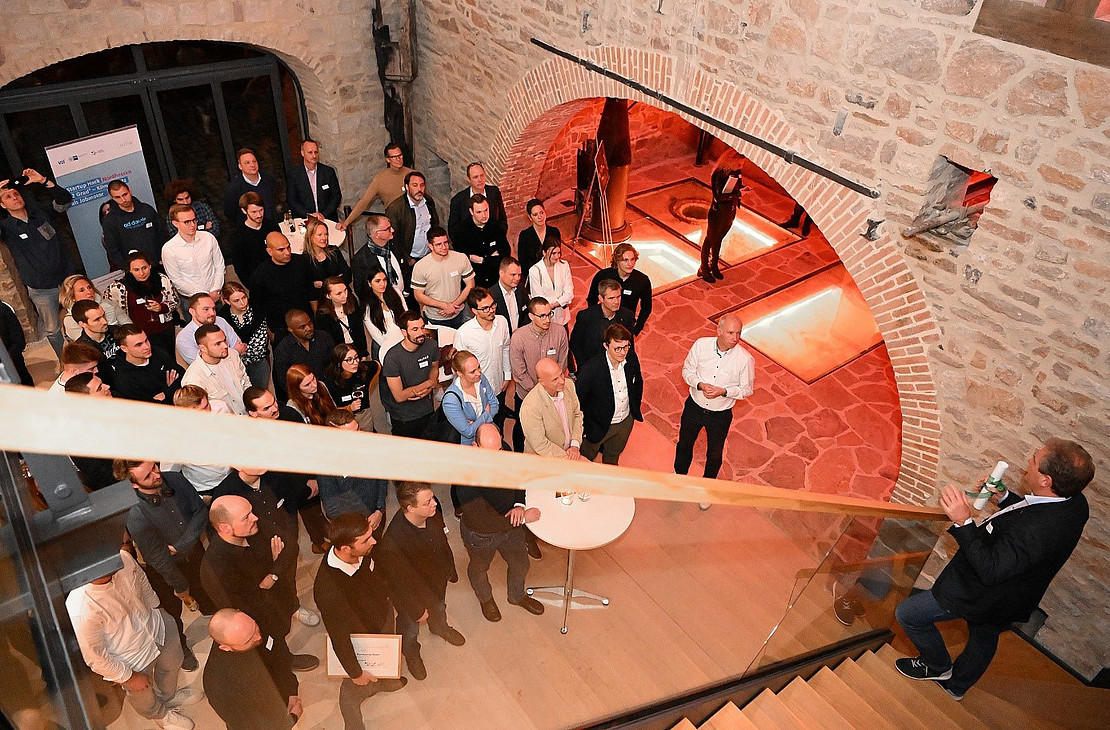This page contains automatically translated content.
Startup Hack North Hesse
 Image: Harry Soremski.
Image: Harry Soremski.Seven of these teams had just emerged at the beginning of the week, the others joined with a research background or a spin-off idea. All of them took up the challenge of "further" developing their business model, optimizing it and achieving the greatest possible impact on sustainability and climate protection. Three teams were awarded prizes, but all felt like winners that evening.
The initiators of the Startup Hack around Prof. Jens Hesselbach and Prof. Mark Junge from the University of Kassel and Stefan Rötzel from the Science Park led through the exciting program, which focused on the startup ideas. "We want to ignite a start-up spirit combined with sustainability awareness," said Prof. Mark Junge about the initiative's approach. "In the third year, we have been able to achieve even stronger cooperation between VDI Nordhessen, the Economic Development Agency, the accelerator "#NorthhessenAccelerates", as well as the University of Kassel and the Science Park," Prof. Jens Hesselbach pointed out, adding. "We want to go one step further and realize a green tech hub." Building on the University of Kassel's sustainability profile, the aim is to create even more spin-offs that bring green technologies and services to societal applications. "Given the major challenge of climate change, we need a diversity of ideas and innovations that demonstrate viable alternatives for the future," Rötzel said, illustrating this with the broad spectrum of team ideas. The topics of the twelve start-up ideas included research-based innovations from plastics technology and measurement technology, energy management, recycling, the use of heat pumps, compliance with environmental standards in companies, to sustainable nutrition concepts, mobility and vacation models.
Each team presented its business model in 7 minutes to the guests and the jury. The latter awarded the best newcomer and the best bootcamp team, who can define their own prize within certain limits. "We don't want to impose prizes on the winning teams, but support them according to their needs", Prof. Mark Junge pointed out and introduced the award ceremony. Enver Teman and Kolja Buchweitz were awarded as "Best Newcomer". "The team is developing a Tiny House Eco-Village for future-proof and sustainable vacations. The Tiny Houses are planned in a sustainable and resource-efficient way. With a digital booking and management platform, the operators of such Eco-Villages are supported. On the one hand, this is climate-friendly and on the other hand, it is a scalable business model", said the laudator Dr. Mandy Pastohr (Head of Department Hessian Ministry for Economy, Energy, Transport and Housing).
Sebastian Hagemeier, Hüseyin Serbes and Tobias Pahl were awarded as "Best Bootcamp Team". In his laudatory speech, Dr. Hans-Friedrich Breithaupt (GF F.W. Breithaupt & Sohn GmbH & Co. KG, Vice President IHK) emphasized that innovative measurement technology can provide a boost for many SMEs. The scientific employees are working on the founding idea for a patented measurement process from the Department of Measurement Technology at the University of Kassel. With their innovative measurement technology, they can measure directly in production rooms because they compensate for vibrations. In addition, special measurement applications are also conceivable where measurements and also quality management were previously not possible. This increases quality and prevents production errors.
Niklas Hoffmann, Johanna Geiser and Ruwen Erler were awarded for the best team performance. Innovation consultant and coach Stefan Rötzel pointed out that this team had already developed secjhs ideas before starting. The team had set itself the task of optimizing the key activities of energy consultants, increasing their efficiency and thereby increasing the renovation rate. Since they are currently training to become energy consultants themselves, they felt very tangibly strongly about the idea, Rötzel said. The team received three months of access to the CoCreationLab at Sciencepark, a space and coaching services for early-stage founders. All other teams were also invited there for a compact week in early January 2023. They will all continue to be accompanied and supported by technical and methodological expertise and by the network.